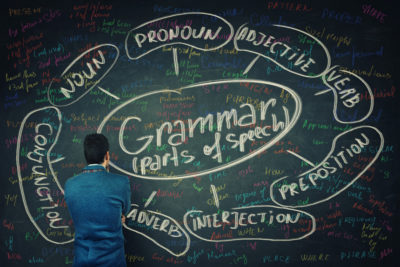If you have someone in your life who helps you make sure your writing is grammatically correct — a spouse, a parent, a coworker, a paid copy editor — today, March 4, is a great day to show your appreciation. It’s National Grammar Day!
Begun in 2008, National Grammar Day is the brainchild of Martha Brockenbrough, author of, among other books, Things That Makes Us [sic]. She chose March 4 as the day to celebrate grammar because, when spoken aloud, the date becomes the complete and grammatically correct sentence “March forth!”
But when it comes to grammar, many people are unfortunately more interested in denigration than celebration, and some might view National Grammar Day as an opportunity to impose their vision of “proper grammar” onto those around them. These type of people will publicly point out errors (or what they believe are errors) in other people’s words, whether they’re spoken, typed, or hastily thumbed out on their smartphones. They’ll take pot shots at grocery-store express checkout lanes for shoppers with “12 items or less” rather than “12 items or fewer.” Some may go so far as to whip out a Sharpie and deface public signs — adding missing punctuation or proofreader’s marks — in the name of “correctness.”
Such unsolicited “correction” of people’s grammar and usage is not only rude, it’s misguided. Don’t do it — especially not today.
Our English teachers tried to teach us good grammar in grade school: How to form plurals. How to conjugate verbs. Where to place commas. How to construct — as well as deconstruct — complex sentences. (Many of these rules aren’t technically grammar at all, but usage and syntax and mechanics, but in the common parlance, we lump them all under the heading grammar in the same we call any music created by an orchestra classical.)
What those same teachers maybe didn’t teach us is that there isn’t only one grammar. There isn’t one set of language rules to govern all English-language communication. There isn’t just one English.
Those grammar-school teachers were teaching us Standard Written English, the form of English preferred by publishing houses and in academia for (surprise!) writing, and conforming to tenets set down by prescriptive authorities (like the Associated Press).

Problem is, no one naturally speaks in Standard Written English — that’s why they have to teach it in school. And while the rules of Standard Written English can be a good guideline for extemporaneous speech, they aren’t absolute. Grammar isn’t monolithic, and language is fluid. People from different locations and backgrounds naturally use different grammatical and mechanical constructions; that’s called dialect. And one’s way of speaking — in word choice, enunciation, and formality — can change from one situation to the next; that’s called register.
We switch registers all the time without even thinking about it. Just think about how, say, a high school student speaks to a teacher in class, compared with how she speaks to the principal when she’s called into the office for a disciplinary problem, compared with how she tells her friends after school about the whole affair. Each situation involves a different level of formality and intimacy that are reflected in language.
We instinctively switch registers all the time depending on whom we are communicating with and how. And while some of the language choices we make don’t jibe with Standard Written English, that doesn’t mean they’re wrong. So while y’all and yinz might not fly in a formal paper, they are perfectly acceptable — which is to say, grammatical — in informal conversations. Same with ain’t.
This idea of the situational malleability of grammar can be difficult for some people to accept. We like our rules, our right-wrong binaries. We like the idea of grammar as mathematics — that there is One Right Way to construct any given sentence, and it’s just a matter of the correct application of rules to find it.
Even professional copy editors — like myself — have struggled with this idea. Many have admitted to me that, in their early lives, they often felt compelled to “help” people use the English language “correctly” by pointing out danglers, misconjugated verbs, nonstandard usage, and mispronunciations. I know I did. I also know exactly when I stopped and why:
Early in the millennium, at a time when I was making the transition from proofreading to copy editing, my then-wife and I were occasionally invited to dinner parties at the home of one of her coworkers — we’ll call her Isabelle. Isabelle was from Brazil; English was her second language. I generally enjoyed the gatherings, and the food was usually fantastic, but during our third or fourth dinner party, I noticed that Isabelle seemed reticent around me.
I mentioned it to my wife on the drive home, and she told me, “Isabelle’s afraid to speak English around you because she thinks you’ll correct her in front of everybody.”
I felt horrible. I had made Isabelle self-conscious and uncomfortable around me because I felt like I had the authority and latitude to “help” her use English “correctly.” I vowed that I would never make anyone feel like that ever again.
And neither should you.
So don’t celebrate National Grammar Day by being an insufferable know-it-all. There are other, more constructive ways to mark the day:
- Focus on your own writing. Is your writing really strong enough that you can critique others’?
- Learn something new about grammar and usage. Like podcasts? Try Grammar Girl. More of a reader than a listener? There are plenty of blogs for you; try Grammargeddon, Grammarphobia, or, for fun comparisons of American and British English, Separated by a Common Language. Or grab an actual dead-tree book (browse through the 420s at your local library).
- Celebrate the ways people intentionally and effectively break the rules of Standard Written English. (Cormac McCarthy won a Pulitzer Prize for a novel that contains plenty of dialogue but no quotation marks.)
- Listen to the ways people speak, and instead of judging their grammar as right or wrong, enjoy the myriad ways people communicate, and consider how your own language has been molded by your experiences.
- Grammar isn’t limited to English, of course, so if you’ve ever dreamed of learning a new language, today is a great day to start.
- By all means, enjoy Weird Al Yankovic’s “Word Crimes” video for the umpteenth time.
- If you have someone who makes your writing better, thank them. (Gifts are always appreciated, of course.)
But unless someone asks for your help or you’re paid to do it, don’t criticize the way other people speak or write. Yes, bona fide mistakes will go uncorrected — who doesn’t make mistakes? You can certainly bask in smugness for recognizing a grammatical “error,” but you won’t be making the world a better place by calling it out.
Featured image: Shutterstock
Become a Saturday Evening Post member and enjoy unlimited access. Subscribe now



